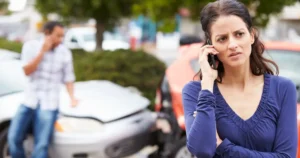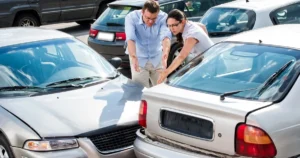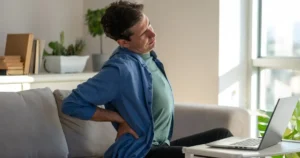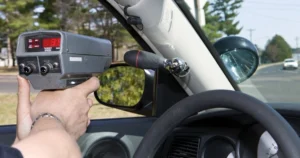
Car crash cases rarely go to trial. However, a court case could be needed if two parties cannot agree on a settlement amount or determine who is at fault.
Below, Pfeifer, Morgan and Stesiak explore why a case may go to trial and what role an expert witness plays in a court case. We also discuss whether a crash victim’s presence is needed in court.
If you are a car crash victim and are unsure how to navigate the legal process, contact our South Bend car accident lawyers. There are no upfront costs or fees to pay.
Call our office today at (844)-678-1800 for a FREE case review.
What Factors Determine Whether a Case Goes To Trial?
Car crash cases could end up before a judge if the parties involved are unable to agree to a settlement. If neither party can agree on who is at fault or crash investigators are unable to clarify fault due to the circumstances of the accident, then a case could be escalated to trial.
Here are some other factors that can determine if a case goes to trial:
- The insurance company refuses to offer a fair settlement or completely denies a claim.
- Serious injuries or fatalities are involved in the case
- If the insurance companies do not want to negotiate in good faith.
- Disagreement over the value of injuries and/or property damages
- Complex legal issues that make it necessary to go to court (for example, multiple defendants, third-party liability, or product liability)
How Long Could a Car Crash Trial Last?
A car crash trial case can last a few days to several weeks. Every case is different. Several factors determine how long a trial may last, such as:
- Number of witnesses
- The court’s schedule
- The amount of evidence that is presented
- Complexity of the case (For example, if there are multiple parties involved)
- Expert testimony
- The number of legal motions filed by the parties involved (a party could file a motion to exclude evidence in a case)
Is My Presence Required in Court?
If your car crash case goes to court, you will need to be present. This is something your attorney will tell you about in advance if it becomes necessary.
Some car crash victims may feel nervous about having to attend court. It is your attorney’s job to prepare you ahead of time.
How Do I Prepare for a Court Trial?
If your case goes to trial, your attorney will help to prepare you. There are some steps you can take ahead of time to help you prepare as well, such as by doing the following:
- Collect and organize documents: Gather police reports, medical bills, proof of loss of wages, and any other documents related to your car crash. These documents are essentially the details and expenses you have been tracking since day one.
- Consult with your attorney: Ask your attorney any questions you may have that he or she has not already answered. For instance, you may want to ask how to dress appropriately, how the trial will proceed and other specifics about going to court you should expect.
- Practice your testimony: Your attorney is there to help you understand what you should and should not say. However, you can help your case as well by practicing communicating your testimony clearly and concisely. Avoid rambling or adding unnecessary details while you speak. In other words, be mindful to be truthful, but stick to the key points.
- Mental and emotional preparation: Court proceedings are often stressful. Even if you are not being questioned, many people find the process intimidating. This is something you should talk to your attorney about, including what you can do to help manage your emotions and stress levels.
- Understand courtroom procedures: Your attorney should help prepare you for any proper courtroom procedures you need to know. However, be sure to ask him or her any unanswered questions you may have. For instance, if you do not understand your role in the trial process, the order of events, and any proper etiquette you need to be aware of while the court is in session.
What Are the Pros and Cons of Going to Trial?
It is important for car crash victims to know the pros and cons of going to trial. This knowledge may help some victims know if it is worth taking their case to trial.
Below, are some of the pros of taking a case to trial:
- Possibility of higher compensation: If your case goes to trial, you may receive higher compensation than whatever settlement the insurance company may have agreed to.
- Opportunity to prove that the other party is liable: If more clarity is needed regarding which party was liable for the crash, you may have the option to pursue your case in court.
- Closure: Car crash victims can get closure by obtaining the compensation they need to recover. For many victims, getting justice gives them peace of mind so they can move forward with their lives.
Here are some of the cons that car crash victims should know about going to trial:
- It is costly: Going to court to resolve your case is more expensive. However, this is one reason why insurance companies may work harder to settle a case out of court.
- Time-Consuming: Trials can take months or even years to conclude. As a result, compensation and stress are prolonged.
- Unpredictable outcomes: Jury decisions can be unpredictable. You may have strong evidence, but it is no guarantee that you will win a case. If the jury awards compensation, it could be less than what you would have gotten in a settlement. The jury may also decide not to award any compensation at all.
- Privacy: Most settlement negotiations are private, while court cases are part of public records.
How Is Evidence Presented During a Trial?
In court, evidence can be presented as a testimony, video, witness, physical object, documents or other type of evidence. Evidence must support or clarify what happened at the scene of the car crash. You and your attorney can object to evidence if it is irrelevant to what happened at the scene of a car collision. However, it is up to the judge to decide what evidence is admissible in a case.
What Type of Evidence Could Be Subject to an Objection in Court?
Here are some types of evidence the court may object to:
- Hearsay: Any statement that is made by someone outside of court. For instance, someone who made a statement about the case but who is not testifying in court or who is not present to confirm their statement.
- Opinion testimony: Testimonies that are not based on actual knowledge or expertise.
- Character evidence: In a car accident case, character evidence could be omitted if it is irrelevant, unreliable or prejudicial.
What Role Do Expert Witnesses Play in the Trial?
Expert witnesses play a key role in car crash trials. They can provide specialized knowledge and expertise to help the court understand complex issues.
Here are some of the expert witnesses that could be useful for a car accident case:
- Accident reconstruction experts: These individuals have special training and knowledge. They can be hired to use their skills to do a deeper dive into factors that may have caused your collision. They utilize various tools, incorporating technology and scientific evidence to help clarify events leading up to the crash. They may provide other visuals of the crash too, such as a 3-D model of how it occurred.
- Medical experts: Medical experts can provide information about a specific injury or medical condition and how it was either caused by or worsened by a crash. They can also provide more details about what medical treatment may be required, the long-term impact on the victim and the victim’s expected recovery time.
- Engineering experts: Car engineers help to provide information about the vehicle design and its features. They can also provide insight into road structure and design, as well as the construction of buildings as it relates to a crash and more.
- Financial experts: Various economic expenses will need to be calculated after a car crash. A financial expert can help with this. For instance, by determining how an injury will impact an injured victim’s ability to earn income in the future.
Call Our South Bend Office for Legal Assistance
We understand that navigating the legal process is challenging for car crash victims. However, you do not have to go through this process alone. Our experienced car crash attorneys are prepared to help you get the compensation you need.
We do not charge any upfront costs. We only get paid if we win your case and you receive compensation.
Call our office today to speak to one of our attorneys. (574) 444-0741.













